| |
|
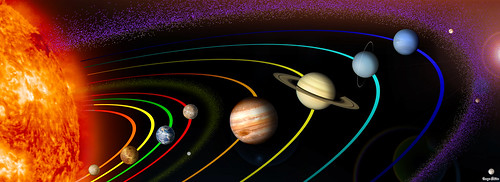 |
| 01 The Solar System PIA10231, mod02 |
by Image Editor on Flickr |
|
- This is our Solar System.
- It consists of 8 planets, 1 star in the center and several dwarf planet.
- The solar system is made up of everything that orbits the sun such as asteroids, planets, comets, and moons.
- We all live in a galaxy called the milky way.
|
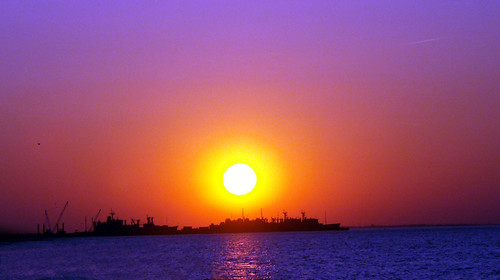 |
| Sandy Hook Sunset |
by Sister72 on Flickr |
|
- The Sun is the center of our solar system.
- The sun is a star.
- It is also a burning ball of gas.
- The sun keeps all the planets in orbit with its gravitational pull.
- If the sun was to burn out all the planets would spin out of orbit and become frozen in the vast open space.
- It is so important to the solar system because without it there would be no heat, no orbit and no US.
- This is why the sun is so important it keeps everything alive.
|
 |
| giugno 1.2007 Luna piena, full Moon, Vollmond |
by pizzodisevo (therapy - terapia - Therapie ) on Flickr |
|
- The first planet in our solar system is Mercury.
- Unfortunately, there was no picture of Mercury available so we are going to call this mercury.
- Mercury is the closest planet to the sun and oddly enough it is not the warmest planet.
- The temperature of Mercury is very hot in the day but very cold at night.
- It is the second smallest planet and too close to the sun for there to be life on it.
|
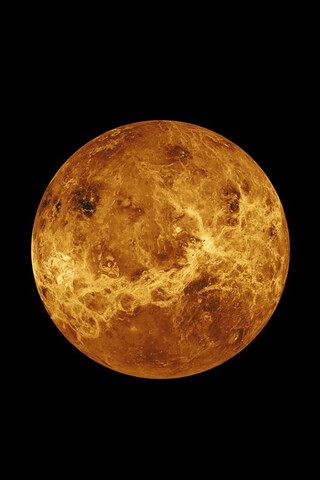 |
| Venus |
by chrismeller on Flickr |
|
- This is Venus the second planet from the sun.
- Venus is the hottest planet in the solar system.
- The reason Venus is the hottest planet and not Mercury, is because Venus is almost all greenhouse gases.
- Venus is also too hot for there to be life on.
- If you were to find the relative size of all the planets by using fruits Venus would be a green grape.
|
 |
| Earth, courtesy Apollo 17, and probably the most reproduced image of all time |
by woodleywonderworks on Flickr |
|
- Earth is the third planet from the sun.
- It is at just a good enough distance from the sun for to be able to have enough warmth and coldness for us to live on.
- It takes 24 hours to rotate once on its axis and 365 days to make one full revolution around the sun.
- It has a strong gravitational pull which keeps us on the Earth.
- It has one moon which is always orbiting the Earth.
|
 |
| Planet Mars |
by cosmobc on Flickr |
|
- This is Mars the fourth planet from our solar system.
- Mars is smaller than Earth.
- Mars is covered in rust, that is why it looks so red.
- Mars has a moderately cold temperature.
- Technology such as the mars rover has been sent into space to learn more about this planet.
- Mars is a little bit smaller than earth and does not have life on it, or at least we know this from our knowledge.
|
 |
| Jupiter |
by chrismeller on Flickr |
|
- This is Jupiter, the fifth planet from the sun.
- Jupiter is the biggest planet in the solar system.
- Jupiter has yellow bands wrapping around it.
- It also has a great red spot which origins are unknown.
- Jupiter has quite a warm climate, believe it or not, and is completely made up of gas.
- There is a great distance between jupiter and mars. Jupiter far from the sun.
- If the planets were being modeled as fruits, Jupiter would be a pumpkin.
|
 |
| Saturn |
by chrismeller on Flickr |
|
- This is Saturn, the sixth planet from the sun.
- It is the second biggest planet in the solar system.
- It has 1000+ rings.
- It can reach extremely cold temperatures and has bands wrapping around it.
- Its rings are visible without the aid of a telescope.
|
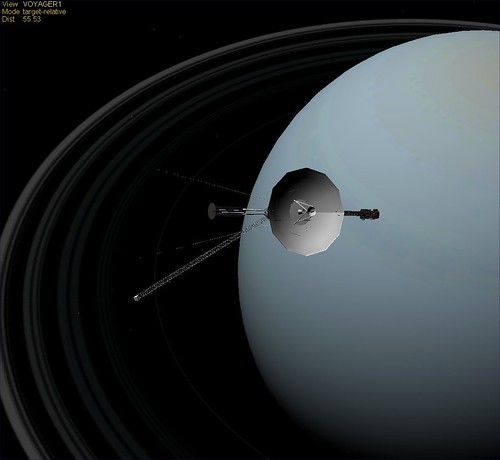 |
| Voyager Uranus |
by FlyingSinger on Flickr |
|
- This is Uranus, the seventh planet from the sun.
- This planet is very cold.
- It is tilted on its side for reasons that are unknown.
- It also has very thin rings.
- It appears to be blue because of its surface.
- It cannot be seen without a telescope.
- It has a very long revolution period as you may have guessed.
|
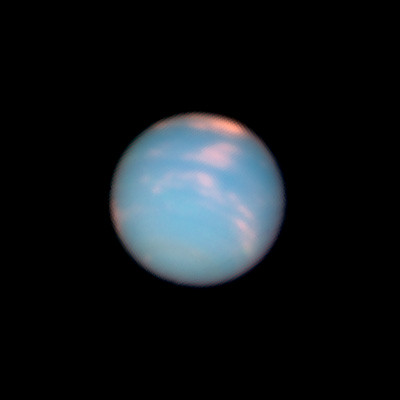 |
| Hubble's Neptune Anniversary Pictures |
by NASA Goddard Photo and Video on Flickr |
|
- This is Neptune, the eighth planet from the sun.
- Neptune is also very very cold.
- Neptune is the last planet that is actually classified as planet in our solar system.
- Neptune also looks blue because of its surface and is about the same size as Uranus.
- Neptune is also a name for the god of the sea.
|
 |
| Pluto |
by chrismeller on Flickr |
|
- This is the most famous dwarf planet in our solar system and the ninth planet from the sun.
- Pluto is the coldest planet in the solar system.
- It is the farthest planet from the sun.
- It takes about 220 years for it to orbit completely around the sun.
- It is the smallest planet in the entire solar system.
- If you were modelling the solar system as fruits, Pluto would be an apple seed.
|
 NeoK12.com - Educational Videos, Lessons, Quizzes & Presentations
NeoK12.com - Educational Videos, Lessons, Quizzes & Presentations









